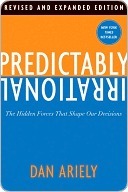More on this book
Community
Kindle Notes & Highlights
we not only tend to compare things with one another but also tend to focus on comparing things that are easily comparable—and avoid comparing things that cannot be compared easily.
That's a lesson we can all learn: the more we have, the more we want. And the only cure is to break the cycle of relativity.
With everything you do, in fact, you should train yourself to question your repeated behaviors.
We should also pay particular attention to the first decision we make in what is going to be a long stream of decisions (about clothing, food, etc.). When we face such a decision, it might seem to us that this is just one decision, without large consequences; but in fact the power of the first decision can have such a long-lasting effect that it will percolate into our future decisions for years to come.
Socrates said that the unexamined life is not worth living. Perhaps it's time to inventory the imprints and anchors in our own life. Even if they once were completely reasonable, are they still reasonable? Once the old choices are reconsidered, we can open ourselves to new decisions—and the new opportunities of a new day.
when a social norm collides with a market norm, the social norm goes away for a long time. In other words, social relationships are not easy to reestablish. Once the bloom is off the rose—once a social norm is trumped by a market norm—it will rarely return.
MONEY, AS IT turns out, is very often the most expensive way to motivate people. Social norms are not only cheaper, but often more effective as well.
remember that social norms can play a far greater role in society than we have been giving them credit for. If we contemplate how market norms have gradually taken over our lives in the past few decades—with their emphasis on higher salaries, more income, and more spending—we may recognize that a return to some of the old social norms might not be so bad after all. In fact, it might bring quite a bit of the old civility back to our lives.
OWNERSHIP IS NOT limited to material things. It can also apply to points of view. Once we take ownership of an idea—whether it's about politics or sports—what do we do? We love it perhaps more than we should. We prize it more than it is worth. And most frequently, we have trouble letting go of it because we can't stand the idea of its loss. What are we left with then? An ideology—rigid and unyielding.
In running back and forth among the things that might be important, we forget to spend enough time on what really is important. It's a fool's game, and one that we are remarkably adept at playing.
even our own behavior can be influenced by our stereotypes, and that activation of stereotypes can depend on our current state of mind and how we view ourselves at the moment.
When stripping away our preconceptions and our previous knowledge is not possible, perhaps we can at least acknowledge that we are all biased. If we acknowledge that we are trapped within our perspective, which partially blinds us to the truth, we may be able to accept the idea that conflicts generally require a neutral third party—who has not been tainted with our expectations—to set down the rules and regulations.
we'll see not only that beliefs and expectations affect how we perceive and interpret sights, tastes, and other sensory phenomena, but also that our expectations can affect us by altering our subjective and even objective experiences—sometimes profoundly so.
Behavioral economists, on the other hand, believe that people are susceptible to irrelevant influences from their immediate environment (which we call context effects), irrelevant emotions, shortsightedness, and other forms of irrationality
By the time we comprehend and digest information, it is not necessarily a true reflection of reality. Instead, it is our representation of reality, and this is the input we base our decisions on.


